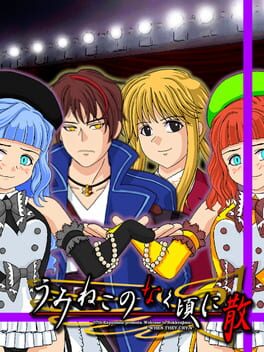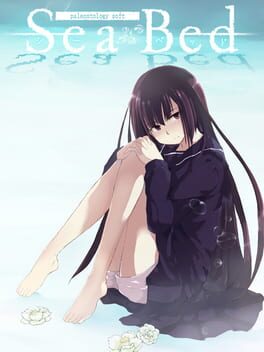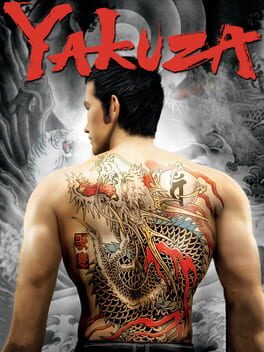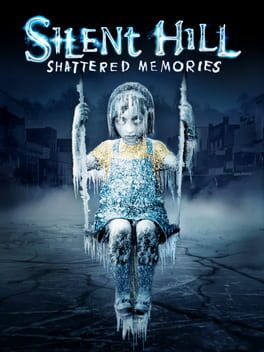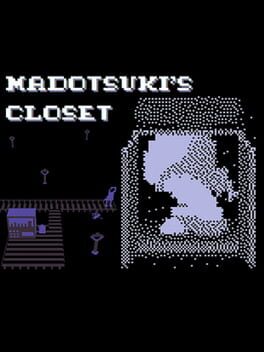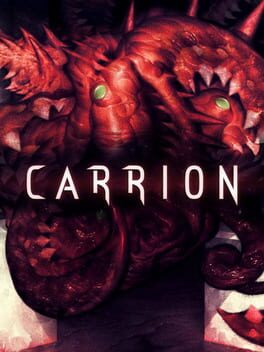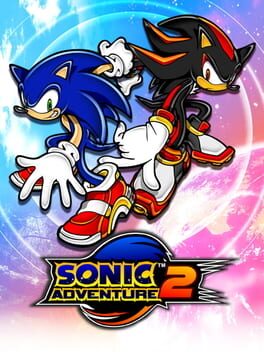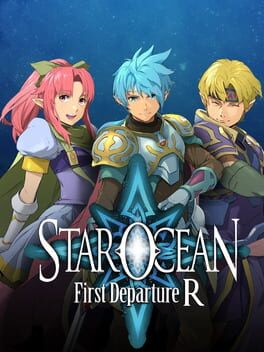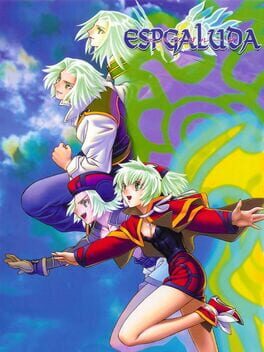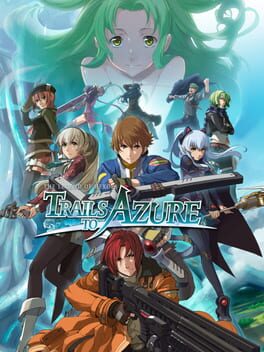wasnotwhynot
13 reviews liked by wasnotwhynot
Yeah, I'm completely checked out. First 3/4s of the tea party was maybe the most hyped I've ever been playing umineko but the sappy way it resolves ruins it, and the rest of the episode's a snoozefest.
Gonna play ep 8 of course but this is a huge step down from higurashi. Ryukishi focused so much on the pointlessly reader-adversarial mystery that he forgot to tell a good story.
Gonna play ep 8 of course but this is a huge step down from higurashi. Ryukishi focused so much on the pointlessly reader-adversarial mystery that he forgot to tell a good story.
SeaBed
2016
In terms of the intensity and depth of the emotional response it engendered in me, Seabed compares neatly with The House in Fata Morgana. It takes a completely different, much quieter and subtler path to get there, obviously. Fata Morgana gets there with the most hard hitting melodrama possible. Seabed gets there through countless quiet moments, all working in concert to slowly weave a spell over you without you even realizing.
As a text game dev, I deeply appreciate the presentation. The whole story is told through VA-less NVL-mode walls of text, borrowed royalty-free music, as few VN presentation tricks as humanly possible, and a combo of blurred photo and cheap blender backgrounds. The only major points of aesthetic interest are the beautiful character illustrations by hide38 (who also wrote the script).
And the story still hits like a truck. When you make your characters and their longings feel this real in the reader's heart, you don't need voice acting or a bunch of expensive one-off assets. Seabed does exactly what it needs to with the presentation to support the writing, then gets out of the way and lets the story speak for itself. I think that's really admirable, and speaks to a confidence that a lot of devs would benefit from.
If all this sounds back-handed, it shouldn't. Some of the most well-loved VNs in history are doujin games like Higurashi or Tsukihime, which used similar aesthetic shortcuts. I cherish many VNs with super-loved-on presentation. But my favorites will always be the ones that make me believe in their stories, and you get there first and foremost with strong writing.
Seabed is as affecting a story as any visual novel I've read. I don't have much to say beyond that that wouldn't spoil the shape of the story (hence why I spent three paragraphs soapboxing about VN direction). If you're up for the slowest of slow burns, and you appreciate VNs with grown-up theming that don't talk down to you, give this one a read.
As a text game dev, I deeply appreciate the presentation. The whole story is told through VA-less NVL-mode walls of text, borrowed royalty-free music, as few VN presentation tricks as humanly possible, and a combo of blurred photo and cheap blender backgrounds. The only major points of aesthetic interest are the beautiful character illustrations by hide38 (who also wrote the script).
And the story still hits like a truck. When you make your characters and their longings feel this real in the reader's heart, you don't need voice acting or a bunch of expensive one-off assets. Seabed does exactly what it needs to with the presentation to support the writing, then gets out of the way and lets the story speak for itself. I think that's really admirable, and speaks to a confidence that a lot of devs would benefit from.
If all this sounds back-handed, it shouldn't. Some of the most well-loved VNs in history are doujin games like Higurashi or Tsukihime, which used similar aesthetic shortcuts. I cherish many VNs with super-loved-on presentation. But my favorites will always be the ones that make me believe in their stories, and you get there first and foremost with strong writing.
Seabed is as affecting a story as any visual novel I've read. I don't have much to say beyond that that wouldn't spoil the shape of the story (hence why I spent three paragraphs soapboxing about VN direction). If you're up for the slowest of slow burns, and you appreciate VNs with grown-up theming that don't talk down to you, give this one a read.
Yakuza
2005
The stark contrast between the English dubs "You fucking piece of shit! You're fucked if you think you can fuck my shit up!" and the otherwise slow-burn crime drama plot, I choose to believe, is the origin point for the insane tonal dichotomy the rest of the series is famous for. Either that or Majima being a fucking lunatic.
Actually a pretty amazing game, and can only assume it's hard-to-describe distance from the first four is why it's rated so much lower. There are aspects here I believe to be straight-up more effective than any other Silent Hill, then there are things that are entirely absent, like the horror and combat. I think this is the first time I wished that this wasn't a video game or didn't have to be a Silent Hill, for the enhanced freedom to drink up the environment made the exploration segments feel like watching a Lynch film. Having an American team, to me, made the environment genuinely feel American. I've been to places that look exactly like these locales! I can fill in their smells and see the phantoms of where people would be. The decay and desolation felt more real to me, more effectively liminal. Other than the shitty reveal, this may also be the best-written Silent Hill (dialogue and character-wise, the semiotics were weak). I spent the whole game speculating Harry's role, thinking he abandoned his daughter and ultimately destroyed both of them. I thought for a bit that Dahlia was Cheryl at her absolute lowest, hooking up with her father without either realizing it. Shit left a lot of room for speculation, and I really wish they didn't lay all their cards out. All these broken women coming in and out of Harry's life, all of which you get to choose if you be creepy towards or respect certain boundaries, I felt was building towards a greater reveal. The ice-otherworld sequences I could've done without. By the second time, it had already become confusing and unmemorable. Luckily they don't take up that much of the game. The atmosphere really is such a boon to making the experience feel terrific. There were a few points where I just stared at the side of a building, letting Best Game Composer work his magic on me. I read every sign the PS2 gave a decent resolution to and got disappointed every time I accidentally progressed before getting to check every single corner for details. What else... Michelle and Dahlia had killer fits, and apparently they change off your behaviour? Really cool. Also a little disappointing that all the therapy mini-games just led to a pretty general ending and a meaningless astrology reading, but I don't know how much was reasonable to expect. They were engaging, which is the best I can ask for. I'd heard it did a lot more with it's psychology mechanics, and was expecting it to, than it actually felt like it did. The ways it does utilize them, however, I found very fun. By no means a masterpiece, definitely worth playing, at least to hang out in.
Madotsuki's Closet
2021
[post-note: in the vein of the game, this "review" is a deeply personal and voyeuristic look into myself. it's alright, you can come in. after all, half of the five people that might see this have already looked away with this foreword, and no one consequential in my life will ever find this.]
I sobbed through pretty much every second of this. Brief respites of laughter cut the raw resonance of emotion I brought upon myself. But it's not art, is it? It's a voyeuristic journal entry, a thing not to be anything, a mere piece of appreciation that likely picked up traction accidentally through wearing the skin of a fan-game. It's a self-evaluation tucked away in the infinite somewhere of the wired world. Yet, it's identically the exact experience I seek from any piece of media: to be profoundly overcome by a contextualization or re-formatting of the self. My suffering is a tangible existence both in what goes said and unsaid within this space. It rears it's head, it fucks with me, it doubts me, it tells me exactly what I want to hear, it tells me what I left behind, what I wish I had. It speaks to me in all the ways I speak to myself. I haven't experienced art. I've experienced another human being. I looked through her past, her personas, her friends and her dreams, and yet selfishly in her, I only saw myself. I think a lot of the untenable, uncrossable bridge, the endless space that exists between our minds. I'm so scared to talk sometimes, though I know I have so much to say. I can't translate myself except through my words, yet civil standards, self-doubt and floating judgements cut my tongue and halt my pen. I want to transcribe my bridge. I want people to see beyond the body, the voice, the hobbies, the opinions, even the words, to express the rawest form of self, of the magical thing of self that I love and no one else can feel, and to still be loved as that thing, to nullify this whole social game we oppress ourselves with. Madotsuki's Closet was perhaps the closest I've ever felt to standing on someone else's bridge. Even with my closest friends, their physicality and our shared history of things other than the self makes me incapable of willing myself to cleanly pierce through them. I don't mean to imply some odd parasocial bond I have with the creator, for as I said, I stared into it's abyss and only saw myself. It's part of why I sobbed. Her introduction to transness through Yume Nikki with a "there are worse ways" became my exposure through anti-SJW YouTube content making disgusting one who could be so presumptuous and fetishistic to dare challenge the institution of gender. Her jokes and irony became my own mask for online engagement that I renew time and time again to appease the people who use this space as a playground for pleasure. Her messages with her friends became my own hollowness of a lifetime of cowering in fear of my true self, then finally overcoming it all to be met with "oh, cool". The young girl on the bench (and oh GOD did she crush me) became my own wishes to simply have been born different. She became my desire not to be trans or trying to be female, but just to have been born it with the privilege of not having to question. She became my unalterable skeleton oppressing me from the deepest recesses of my flesh. She became, at once, all from my childhood I was while also being all the hundreds of little signs I missed and didn't have the language to will or question. She became who I dressed up as or roleplayed under the covers or in my literal closet. She became my opting into silence to not hear my own voice, my tantrums after haircuts, my rejection of masculine hobbies, my starving myself to be shorter and more frail, my fiction writing to create worlds and characters to escape into, my longing for death as my body turned itself more and more uninhabitable with the loss of that childhood androgyny. She became the childhood and happiness and optimism and celebrated, babied, blissful ignorance that everyone seemed entitled to up until their teens, but that I felt I had been born without. I appropriated Bagenzo's literal dreams, and I feel dirty for it. I took them and imposed myself on them. I overwrote her, and I can replay her, share her, discuss her like a thing to be chewed, swallowed and shat out. Yet, in overriding her, I filled in the holes of myself. I paved the narrative of pursuit of traditional femininity that underlied my whole childhood. I bridged the gap between the art I enjoy and their reflections on the person I am. Much like Yume Nikki, much like the thousands of fan theories on it, I took someone elses dreams and projected myself on them, not until they made sense, but until I did. This was perfect, exemplary of the very things I want from life and art. Yet, what was it that I am considering exemplary? Is the game a perfect product, is Bagenzo a perfect writer, or is what I have taken in a perfect addition to my self? I think rankings disgust me now, as do all the arguing I've done to uphold opinions and all the art I've experienced for other people. I'm not going to bother answering... the void has listened long enough. Perhaps I've let one of you onto my bridge, or perhaps not. Perhaps I appear insane, self-indulgent, pretentious. That's all right, as long as my bridge exists for now in this magical somewhere. As for me, don't worry, I've made peace with most of this stuff. But something tells me you might not have seen "me" here, right? You saw whatever could be morphed into you. If art is to be defined as anything, perhaps it's that.
I sobbed through pretty much every second of this. Brief respites of laughter cut the raw resonance of emotion I brought upon myself. But it's not art, is it? It's a voyeuristic journal entry, a thing not to be anything, a mere piece of appreciation that likely picked up traction accidentally through wearing the skin of a fan-game. It's a self-evaluation tucked away in the infinite somewhere of the wired world. Yet, it's identically the exact experience I seek from any piece of media: to be profoundly overcome by a contextualization or re-formatting of the self. My suffering is a tangible existence both in what goes said and unsaid within this space. It rears it's head, it fucks with me, it doubts me, it tells me exactly what I want to hear, it tells me what I left behind, what I wish I had. It speaks to me in all the ways I speak to myself. I haven't experienced art. I've experienced another human being. I looked through her past, her personas, her friends and her dreams, and yet selfishly in her, I only saw myself. I think a lot of the untenable, uncrossable bridge, the endless space that exists between our minds. I'm so scared to talk sometimes, though I know I have so much to say. I can't translate myself except through my words, yet civil standards, self-doubt and floating judgements cut my tongue and halt my pen. I want to transcribe my bridge. I want people to see beyond the body, the voice, the hobbies, the opinions, even the words, to express the rawest form of self, of the magical thing of self that I love and no one else can feel, and to still be loved as that thing, to nullify this whole social game we oppress ourselves with. Madotsuki's Closet was perhaps the closest I've ever felt to standing on someone else's bridge. Even with my closest friends, their physicality and our shared history of things other than the self makes me incapable of willing myself to cleanly pierce through them. I don't mean to imply some odd parasocial bond I have with the creator, for as I said, I stared into it's abyss and only saw myself. It's part of why I sobbed. Her introduction to transness through Yume Nikki with a "there are worse ways" became my exposure through anti-SJW YouTube content making disgusting one who could be so presumptuous and fetishistic to dare challenge the institution of gender. Her jokes and irony became my own mask for online engagement that I renew time and time again to appease the people who use this space as a playground for pleasure. Her messages with her friends became my own hollowness of a lifetime of cowering in fear of my true self, then finally overcoming it all to be met with "oh, cool". The young girl on the bench (and oh GOD did she crush me) became my own wishes to simply have been born different. She became my desire not to be trans or trying to be female, but just to have been born it with the privilege of not having to question. She became my unalterable skeleton oppressing me from the deepest recesses of my flesh. She became, at once, all from my childhood I was while also being all the hundreds of little signs I missed and didn't have the language to will or question. She became who I dressed up as or roleplayed under the covers or in my literal closet. She became my opting into silence to not hear my own voice, my tantrums after haircuts, my rejection of masculine hobbies, my starving myself to be shorter and more frail, my fiction writing to create worlds and characters to escape into, my longing for death as my body turned itself more and more uninhabitable with the loss of that childhood androgyny. She became the childhood and happiness and optimism and celebrated, babied, blissful ignorance that everyone seemed entitled to up until their teens, but that I felt I had been born without. I appropriated Bagenzo's literal dreams, and I feel dirty for it. I took them and imposed myself on them. I overwrote her, and I can replay her, share her, discuss her like a thing to be chewed, swallowed and shat out. Yet, in overriding her, I filled in the holes of myself. I paved the narrative of pursuit of traditional femininity that underlied my whole childhood. I bridged the gap between the art I enjoy and their reflections on the person I am. Much like Yume Nikki, much like the thousands of fan theories on it, I took someone elses dreams and projected myself on them, not until they made sense, but until I did. This was perfect, exemplary of the very things I want from life and art. Yet, what was it that I am considering exemplary? Is the game a perfect product, is Bagenzo a perfect writer, or is what I have taken in a perfect addition to my self? I think rankings disgust me now, as do all the arguing I've done to uphold opinions and all the art I've experienced for other people. I'm not going to bother answering... the void has listened long enough. Perhaps I've let one of you onto my bridge, or perhaps not. Perhaps I appear insane, self-indulgent, pretentious. That's all right, as long as my bridge exists for now in this magical somewhere. As for me, don't worry, I've made peace with most of this stuff. But something tells me you might not have seen "me" here, right? You saw whatever could be morphed into you. If art is to be defined as anything, perhaps it's that.
Carrion
2020
Carrion does One Thing and does it really really well. I was worried at first it would get tedious as the game went on, but it introduces just enough little movement and puzzle mechanics to keep things fresh. I really appreciate the game's restraint; less confident games would have three times as many upgrades, ten times as many optional collectibles. But Carrion only does exactly what it needs to communicate its story. It knows it doesn't need to dangle keys in front of your face to keep you interested.
It was clearly play-tested to hell and back too. It takes a ton of work to make a game that feels this smooth and frictionless without also feeling patronizing. It reminded me of Valve games at their best honestly. The choice to not have an in-game map was inspired, and I'm sure it created a lot of extra work making sure players can stay on track without one, but it fit the tone perfectly.
I appreciate the inclusion of the containment units since it gave me an excuse to run around the game world at the end, see how things fit together. It took maybe an hour to find them all, which felt like exactly the right amount of time I wanted to be backtracking before going back and watching the perfect ending play out. The extra puzzle rooms were fun too, and I appreciate that none of the setpieces ever got hard enough that I got frustrated with the innate imprecision of the movement.
Making a commercial-scale game that's this quietly Rock Solid is a huge accomplishment. There isn't a single thing about it I'd want to add or take out. I can't remember the last game of this scope I could say that about.
It was clearly play-tested to hell and back too. It takes a ton of work to make a game that feels this smooth and frictionless without also feeling patronizing. It reminded me of Valve games at their best honestly. The choice to not have an in-game map was inspired, and I'm sure it created a lot of extra work making sure players can stay on track without one, but it fit the tone perfectly.
I appreciate the inclusion of the containment units since it gave me an excuse to run around the game world at the end, see how things fit together. It took maybe an hour to find them all, which felt like exactly the right amount of time I wanted to be backtracking before going back and watching the perfect ending play out. The extra puzzle rooms were fun too, and I appreciate that none of the setpieces ever got hard enough that I got frustrated with the innate imprecision of the movement.
Making a commercial-scale game that's this quietly Rock Solid is a huge accomplishment. There isn't a single thing about it I'd want to add or take out. I can't remember the last game of this scope I could say that about.
Sonic Adventure 2
2001
Only through time and experience can one gain the sagacity to realize they are a dope with worthless opinions. For four years, when asked the worst video game I've ever played, my default response would usually be this. I loathed it, based mostly on the fact it pissed me off. I remember finding Sonic and Knuckles unplayably jank, the levels all sloppily designed and the rest just generally unfun. The biggest problem in retrospect is that I went in with years of hearing every YouTuber I grew up with disparage the series. In my head, it was nothing but a disappointment factory from a failure company in the years where the Mario Galaxy brothers were collectively still my favourite game of all time. Hell, I don't think I'd have ever even played the damn thing if it wasn't for that Snapcube fan-dub. My opinion, as much as I hadn't realized it, was psychologically pre-emptive, established on experiences which weren't my own. Naturally, the one Sonic game I've played had to reflect that mediocrity. Then, now that I had a position, I found it bombarded by fans of the games or witnessed joy over a game I detested. Eventually, I began to respect the music and, having not touched the Chao garden my first time around, always heard that it was the best part and had to respect it. Originally despising the cast, I came to concede that most of them are quite lovable after playing Murder of Sonic the Hedgehog (though I still sort of detest Sonic's character). I watched videos by hazel and KingK, conceding more and more while still holding arrogantly on to my view out of mere tenacity and the gripping comfort of having a scapegoat. Something in me needed a game to be the worst, to be a 1/10 point of reference by which all could be weighed in displeasure.
Recently, I've been holding off on purchasing games, instead completing or achievement hunting in games that have sat on the backlog long enough to be fatal. Having only the achievements for the Hero Story and First Level, the scent of the burning witch beckoned me. I'd dip my toes in the Chao Garden, perhaps give a couple of the Villain Story levels the old college try. Out of what I can only assume to be trauma from my first run-in with Miss Adventure 2, I looked into graphics and physics mods, admittedly indulging in a few cheats to hasten and make less punishing my return. After some troubleshooting amidst which I complained of the game's awfulness, off I went. While feeling out the Chao Garden, I began to come to a realization. Immediately, the little details charmed me as I scanned the setpieces in the Chao's kindergarten. The mistranslations echoed the charm of the obscure B-titles I'd been playing. The music, textures and skyboxes encapsulated this perfect childhood feeling. The Chao system shocked me in it's complexity, and the damn things were so cute it made me uncomfortable. Between all that and my character of choice, Eggman, hobbling at mach 10 between the homely Japanese schoolhouse and serene Windows screensaver, I was having fun. Not planning to wait around for 3 hours for my two unleveled Chao to develop into an angel and devil, I tried my hand at the Villain Story. I constantly found myself stuck by odd or misremembered mechanics (seriously, why does this game have a power-up system instead of having all the moves from the start?), but it wasn't as unplayable as I remembered. At the very least, getting to bring little treats and creatures back to my baby Chao's after each stage made it all feel worth it (like a true parent enduring the hardships of capitalism, or in this case, Sonic gameplay). On the level White Jungle, however, a change took hold. I was... having a blast. The level flowed incredibly smoothly and intently. The shortcomings of the game began to feel like my own. I began resetting the stage when I died to keep my ring count up, feeling each mistake was my own. I zipped through the stage, tasting each alternative path and feeling out the little secrets for the most rings possible. After finally clearing it, I was awarded with an A-rank. My first playthrough, I got all D's and E's, but this... this felt good. The level felt good. The game felt good. I stayed up until 8AM not only clearing the rest of the Villain story, but clearing the whole Hero story again (no cloud saves, thanks Sega...), collapsing before reaching the final part. Meanwhile, my Chao were around level 40 and I was fueled by an urge to play more and more of the game, weighing whether I would watch my Chao into adulthood or chip my way up to 90 emblems. The last level stunk, and the last boss wasn't nearly the Pinnacle of Gaming hypefest I'd seen it sold as, but what I must note is this itching desire I have, even now, to keep playing. I want to play more, see everything this game has to offer, to love my Chao through each racing cup and to hoard those A-ranks. While a lot of the game is rough to play through and quite often unfun, these alone are not the marks of a 1/10 game.
Be it absolutely drinking up the aesthetics and music, my friend mocking me in Steam DMs or the powerful maternal instinct I developed for, now admittedly, probably the cutest video game character of all time, the "worst game" has merits that I feel like a cretin for trying to take away from people in outputting and arguing my hatred. The moral of all of this self-indulgent rambling is that rating games sucks (hence my lack of stars, though if I must put a number to it now, 3 stars, but that's far too vague given the range of quality). It's a practice locking our value of an object on one experience in one place. I detested Evangelion until I rewatched it at the height of my depression and loneliness, and now it's in my top 5. I dislike very few games, so unless the game is irredeemably degenerate (like I judged the lone king of my half-star rankings, Nekopara), games are art and art is always worth protecting no matter it's quality. A reading for my Moral Philosophy class has taught me that rose-tinting the interior world often extends its effects into the external world, and no doubt this ought to be applied each time a beloved game gets us heated. Give me your buggy, your jank and your low-budget and may we dance the nights away not as enemies, but hand-in-hand for this limited life we have.
Recently, I've been holding off on purchasing games, instead completing or achievement hunting in games that have sat on the backlog long enough to be fatal. Having only the achievements for the Hero Story and First Level, the scent of the burning witch beckoned me. I'd dip my toes in the Chao Garden, perhaps give a couple of the Villain Story levels the old college try. Out of what I can only assume to be trauma from my first run-in with Miss Adventure 2, I looked into graphics and physics mods, admittedly indulging in a few cheats to hasten and make less punishing my return. After some troubleshooting amidst which I complained of the game's awfulness, off I went. While feeling out the Chao Garden, I began to come to a realization. Immediately, the little details charmed me as I scanned the setpieces in the Chao's kindergarten. The mistranslations echoed the charm of the obscure B-titles I'd been playing. The music, textures and skyboxes encapsulated this perfect childhood feeling. The Chao system shocked me in it's complexity, and the damn things were so cute it made me uncomfortable. Between all that and my character of choice, Eggman, hobbling at mach 10 between the homely Japanese schoolhouse and serene Windows screensaver, I was having fun. Not planning to wait around for 3 hours for my two unleveled Chao to develop into an angel and devil, I tried my hand at the Villain Story. I constantly found myself stuck by odd or misremembered mechanics (seriously, why does this game have a power-up system instead of having all the moves from the start?), but it wasn't as unplayable as I remembered. At the very least, getting to bring little treats and creatures back to my baby Chao's after each stage made it all feel worth it (like a true parent enduring the hardships of capitalism, or in this case, Sonic gameplay). On the level White Jungle, however, a change took hold. I was... having a blast. The level flowed incredibly smoothly and intently. The shortcomings of the game began to feel like my own. I began resetting the stage when I died to keep my ring count up, feeling each mistake was my own. I zipped through the stage, tasting each alternative path and feeling out the little secrets for the most rings possible. After finally clearing it, I was awarded with an A-rank. My first playthrough, I got all D's and E's, but this... this felt good. The level felt good. The game felt good. I stayed up until 8AM not only clearing the rest of the Villain story, but clearing the whole Hero story again (no cloud saves, thanks Sega...), collapsing before reaching the final part. Meanwhile, my Chao were around level 40 and I was fueled by an urge to play more and more of the game, weighing whether I would watch my Chao into adulthood or chip my way up to 90 emblems. The last level stunk, and the last boss wasn't nearly the Pinnacle of Gaming hypefest I'd seen it sold as, but what I must note is this itching desire I have, even now, to keep playing. I want to play more, see everything this game has to offer, to love my Chao through each racing cup and to hoard those A-ranks. While a lot of the game is rough to play through and quite often unfun, these alone are not the marks of a 1/10 game.
Be it absolutely drinking up the aesthetics and music, my friend mocking me in Steam DMs or the powerful maternal instinct I developed for, now admittedly, probably the cutest video game character of all time, the "worst game" has merits that I feel like a cretin for trying to take away from people in outputting and arguing my hatred. The moral of all of this self-indulgent rambling is that rating games sucks (hence my lack of stars, though if I must put a number to it now, 3 stars, but that's far too vague given the range of quality). It's a practice locking our value of an object on one experience in one place. I detested Evangelion until I rewatched it at the height of my depression and loneliness, and now it's in my top 5. I dislike very few games, so unless the game is irredeemably degenerate (like I judged the lone king of my half-star rankings, Nekopara), games are art and art is always worth protecting no matter it's quality. A reading for my Moral Philosophy class has taught me that rose-tinting the interior world often extends its effects into the external world, and no doubt this ought to be applied each time a beloved game gets us heated. Give me your buggy, your jank and your low-budget and may we dance the nights away not as enemies, but hand-in-hand for this limited life we have.
I had measured but fairly high hopes going into this one. I'd just played Tales of Phantasia and absolutely adored it, and this game shares a lot of the same core creative team. It's actually a great meta-story -- after chafing under Namco's direction during Tales of Phantasia's development, the creatives left Wolfteam to form their own studio, Tri-Ace. So, Star Ocean was Tri-Ace's first game after its founders escaped from under the thumb of big daddy Namco. It's a great narrative about creatives thumbing their nose at big publishers and making the games -they- want to make.
So it's a shame Star Ocean sucks ass!!! I haven't played an rpg this devoid of charm and joy since Suikoden. It's easy to focus on the nakedly incompetent parts. A popular target is how the game essentially begins with a ninety minute cutscene dropping gallons of lore and exposition about its big sci-fi multi-planetary universe, only to drop you on a single generic fantasy planet for 90% of the game. I'd also mention how the entire last three hours comes out of nowhere and feels totally weak and unearned, and how we only meet each of the two main antagonists minutes before they're killed and exit the story. But there's so little here to latch onto that I don't think fixing the glaring unforced errors would help much, honestly. At least the big mistakes are funny.
I can't speak much to how the remake compares with the original. My partner and I compared scenes from the intro cutscenes with the remake, and the original seemed a little better directed. The remake will smash cut between scenes or music tracks in ways that feel amateurish and ridiculous, and the original at least seems to avoid that. The original's aesthetics feel a little nicer to me too. But I like the fighting in the remake (apparently borrowed from Star Ocean 2) a lot more, so it's all kind of a wash.
Ultimately the foundation here is so rotted through that I don't think it can matter much which version you play. Maybe the SNES version has stronger texture, but I don't think there's any iteration of Star Ocean that compares with the straightforward competence and resonance of Tales of Phantasia. Maybe some creatives benefit from a producer looking over their shoulder after all.
So it's a shame Star Ocean sucks ass!!! I haven't played an rpg this devoid of charm and joy since Suikoden. It's easy to focus on the nakedly incompetent parts. A popular target is how the game essentially begins with a ninety minute cutscene dropping gallons of lore and exposition about its big sci-fi multi-planetary universe, only to drop you on a single generic fantasy planet for 90% of the game. I'd also mention how the entire last three hours comes out of nowhere and feels totally weak and unearned, and how we only meet each of the two main antagonists minutes before they're killed and exit the story. But there's so little here to latch onto that I don't think fixing the glaring unforced errors would help much, honestly. At least the big mistakes are funny.
I can't speak much to how the remake compares with the original. My partner and I compared scenes from the intro cutscenes with the remake, and the original seemed a little better directed. The remake will smash cut between scenes or music tracks in ways that feel amateurish and ridiculous, and the original at least seems to avoid that. The original's aesthetics feel a little nicer to me too. But I like the fighting in the remake (apparently borrowed from Star Ocean 2) a lot more, so it's all kind of a wash.
Ultimately the foundation here is so rotted through that I don't think it can matter much which version you play. Maybe the SNES version has stronger texture, but I don't think there's any iteration of Star Ocean that compares with the straightforward competence and resonance of Tales of Phantasia. Maybe some creatives benefit from a producer looking over their shoulder after all.
Espgaluda
2003
1CC All-Clear, Ageha, 23455360 Pts! Absolutely loved this game to bits, so rewarding and fun to learn. The other Cave shmups I've spent a lot of time with are Mushihimesama and DoDonPachi. Those games are excellent, but very stoic and restrained in terms of storytelling, so this one really surprised me with its extremely hype two part final stage plus three stage epic final boss fight. I didn't think Cave had that kind of storytelling gumption -- I'm extremely excited to dig into ESP Ra.De. down the line.
Cleared on Hard, finished all side-quests. Finished it a while ago, but it's still stuck in my craw, so I feel like writing a review. I'm not going to spoil anything directly but I'm definitely giving impressions of the whole game, so if you're particularly sensitive to spoilers maybe dip now.
This was obviously lovely in a lot of ways, but I think this is where I get off the Trails train for a while. Trails has never been big on stakes, but the lack of lethality to anything in Zero and Azure is just devastating. There's no weight to this anymore. The big scary villains aren't scary because I know no one's ever ever going to die.
It's especially weird because Zero gets most of its resonance from paying off an extremely dark character thread set up in 3rd. You'd think they'd realize it's good to have some edge every now and then in a massive fantasy epic. But if there was any edge left in Zero then it's completely gone in Azure; this is one of the most bloodless stories ostensibly about revolution I've ever seen. The new emphasis on light dating sim mechanics means we also don't get a strong core romance like in Sky. I didn't get to see any of the meager sparks between Elie and Lloyd pay off because I didn't buy her enough stuffed animals to put in her room, whoops.
It's a shame because the character writing is as lovely as ever. I finally upped the difficulty to Hard for this one and I should've done it sooner, it feels amazing and the bosses are super-chunky and fun to unravel. The music and art and setting texture are as gorgeous as always. But at this point Trails is a romance where nobody fucks and a war epic where nobody dies. I've lost my patience for that for the moment.
This was obviously lovely in a lot of ways, but I think this is where I get off the Trails train for a while. Trails has never been big on stakes, but the lack of lethality to anything in Zero and Azure is just devastating. There's no weight to this anymore. The big scary villains aren't scary because I know no one's ever ever going to die.
It's especially weird because Zero gets most of its resonance from paying off an extremely dark character thread set up in 3rd. You'd think they'd realize it's good to have some edge every now and then in a massive fantasy epic. But if there was any edge left in Zero then it's completely gone in Azure; this is one of the most bloodless stories ostensibly about revolution I've ever seen. The new emphasis on light dating sim mechanics means we also don't get a strong core romance like in Sky. I didn't get to see any of the meager sparks between Elie and Lloyd pay off because I didn't buy her enough stuffed animals to put in her room, whoops.
It's a shame because the character writing is as lovely as ever. I finally upped the difficulty to Hard for this one and I should've done it sooner, it feels amazing and the bosses are super-chunky and fun to unravel. The music and art and setting texture are as gorgeous as always. But at this point Trails is a romance where nobody fucks and a war epic where nobody dies. I've lost my patience for that for the moment.
